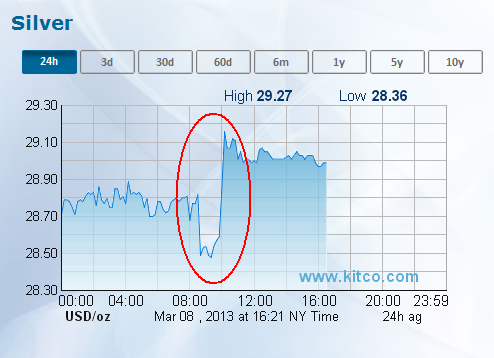Ron Paul: "I had a Federal Reserve Board Chairman testify before the committee that the gold standard had some merits but it was unnecessary because central bankers have now learned how to manage a Fiat currency in a manner in which it would mimic the gold standard. Would anybody care to comment about where the flaw is in that thinking?"
Mr. Lehrman: "I am anxious to comment on that, Dr. Paul. Under--and I must say Mr. Greenspan made the same insipid remark. Mr. Greenspan and Mr. Bernanke will have to then explain why it was that two of the greatest booms in American history, and two of the greatest panics and busts in American financial history, occurred under their 25-year watch..."
Mr. Grant: "The failure of AIG is so instructive in this respect. AIG, this immense insurance company with this ever so brilliant financial products group, didn't do one thing. It didn't mark its positions to market. Finally came the day of judgment and it argued with Goldman Sachs about what these things were worth, AIG said 100 cents on the dollar, Goldman Sachs said not close, Goldman Sachs won that debate and AIG failed.
As with AIG and Goldman Sachs, so it is today with the United States and its Asian trading partners. We never clear our trades. Our dollars go there, and they come right back here. We run twenty five consecutive years of debts on a current account and there will be for us, as there was for AIG, a moment in truth in which we must settle."
U.S. House of Representatives, Committee on Financial Services, Testimony of March 17, 2011
The US will settle, in paper dollars. And if the payment is insufficient, they can always create more.
That is the long and short of it, and the sophistry of modern money. Because the value of the money is self-referential, it is in essence a literal confidence game. The dollar is worth what we say it is, and it is worth it because we say it, without regard to other opinions and considerations to the contrary. And as long as people believe this, or even pretend to believe this even if they don't but are afraid of the consequences of their disbelief, the dollar hegemony is secure.
Money is a matter of force and confidence; and when confidence wavers, force must provide. Force can take many forms, from persuasion to deception and even compulsion.
So the appearance of solidity and confidence must be maintained no matter what. It must, as apparently Messrs. Greenspan and Bernanke have said, must 'mimic the gold standard.' And they are right. Caesar's wife must be above reproach, and the fiat dollar is the dowager queen of empire.
That is why the chat board gimmickry of the platinum coin was such a remarkably dangerous folly. Even given that money is a somewhat specialized area of study, it was shocking that a distinguished economist like Paul Krugman did not seem to understand it. I could attribute that to a moment of political weakness.
But the rest of the world did understand exactly what was happening, and held its breath. Would the US dare to cynically impugn the basis of its debt, even by implication?
Perhaps the greater question, such silliness as trillion dollar platinum coins aside, is how far the Anglo-American financial system is willing to go to keep up the appearance and dignity of a stable global reserve currency in the dollar, even while the dollar is being used and abused by the financiers like a 12th Avenue hooker?
I think you know that I believe that the paper metals markets are an accident waiting to happen, particularly with regard to silver.
It appears that the exchange and the regulators are managing the markets with reckless disregard for their soundness.
So let's see what happens.















































